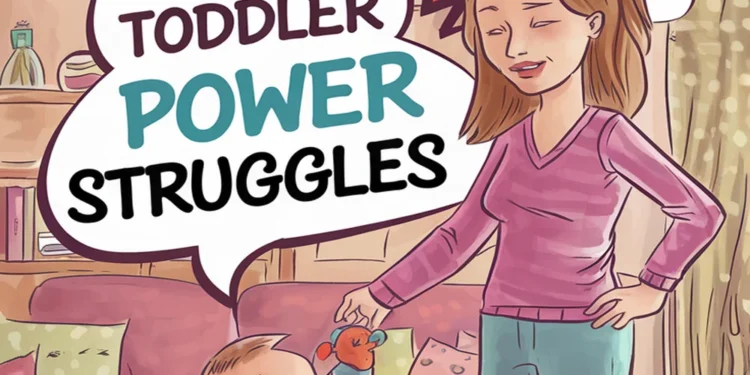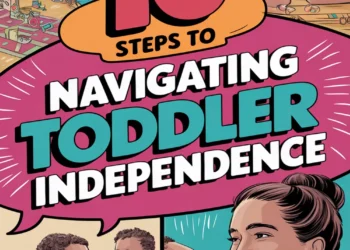Handling toddler power struggles starts with understanding their developmental stage. Offer them empowering choices, using positive language to guide behavior. Stay calm and composed during conflicts, and remember to pick your battles wisely. Consistent routines help create security, while distraction techniques can shift their focus effectively. Validate their feelings to foster connection, and model problem-solving skills. When you follow these strategies, steering their emotions becomes easier. There’s more to explore to make this journey smoother.
Understand Your Toddler’s Developmental Stage
While it might feel overwhelming at times, understanding your toddler’s developmental stage is key to managing power struggles effectively. Toddlers are naturally curious and assertive, wanting to explore their independence. They crave autonomy but often lack the language skills to express themselves fully. Remember, it’s normal for them to test boundaries as they seek control in their world. Recognizing this developmental phase allows you to anticipate their reactions and choose your responses accordingly. Instead of reacting with frustration, try to empathize with their need for independence. Acknowledge their feelings and remain calm. By understanding their perspective, you can navigate these challenges more effectively, creating a supportive environment that fosters both discipline and growth for your little one.
Recommended Items
Explore our handpicked recommendations to make parenting a little easier and more enjoyable!
Offer Choices to Empower
Recognizing your toddler’s desire for independence can guide you in offering choices that empower them. Instead of dictating what they should do, present options that make them feel involved and respected. For instance, let them choose between two outfits or offer a selection of snacks. This small act of autonomy can greatly reduce power struggles, as they feel like active participants in their day-to-day decisions.
Aim to limit choices to two or three to avoid overwhelming them. When your toddler feels in control, they’re more likely to cooperate. Celebrate their choices, reinforcing the idea that their preferences matter. This simple strategy not only defuses tensions but also nurtures their growing sense of independence and self-esteem.
Use Positive Language
Using positive language can transform how you communicate with your toddler, helping to foster cooperation and reduce resistance. When you focus on what you want your child to do instead of what not to do, it encourages better responses. Here are some practical tips to implement positive language in your interactions:
- Emphasize desired behaviors: “Please walk” instead of “Don’t run.”
- Offer encouragement: “I love how you’re sharing your toys” to motivate sharing.
- Use “instead of” phrases: “Let’s play quietly with the blocks instead of being loud.”
- Highlight options: “Would you like to wear the blue shirt or the red one?”
- Acknowledge feelings: “I see you’re upset. It’s okay to feel that way.”
These strategies can lead to a more harmonious and respectful connection with your toddler.
Stay Calm and Composed
Staying calm and composed during toddler power struggles is essential for maintaining a positive atmosphere. When tensions rise, your tone and body language can greatly influence the situation. Take a deep breath and remember that your child is testing boundaries, not trying to provoke you. Try to visualize their perspective; they’re traversing a world full of frustrations and emotions.
If you feel yourself getting upset, pause for a moment. A brief timeout for yourself can help you regain control. Use positive self-talk to remind yourself of your goals: fostering understanding and cooperation. Your calm demeanor will not only help de-escalate the situation but also model emotional regulation for your child. This way, you’re setting a foundation for more effective communication and connection.
Action Steps for Toddler Power Struggles
Implement Consistent Routines
When you implement consistent routines in your toddler’s daily life, it can markedly reduce power struggles and create a sense of security for them. Routines offer a predictable structure that helps toddlers understand what’s coming next, minimizing anxiety and defiance. Here are some practical tips to establish effective routines:
- Morning Wake-Up: Set a regular time to start each day.
- Mealtime Consistency: Serve meals at the same time daily.
- Nap and Bedtime Rituals: Create soothing pre-sleep activities.
- Play and Activity Slots: Designate time for focused play and exploration.
- Transition Signals: Use gentle reminders to prepare for upcoming routine changes.
These strategies can foster a positive environment for both you and your toddler, making daily life smoother and more enjoyable.
Pick Your Battles Wisely
How do you choose which issues to confront and which to let slide during your toddler’s daily adventures? It’s essential to prioritize what’s truly important for their development and safety. You can’t battle over everything, so focus on significant matters while letting minor issues go. Here’s a helpful table to guide your decision-making:
| Important Issues | Minor Issues |
|---|---|
| Safety concerns | Dirty hands |
| Health-related behaviors | Picking outfits |
| Social manners | Food preferences |
| Respectful communication | Toy organization |
| Routine adherence | Playing with mess |
Use Distraction Techniques
Distraction techniques can be incredibly effective during toddler power struggles, helping you redirect your child’s attention away from potential conflicts. When you sense a standoff brewing, try these simple strategies:
- Offer a favorite toy or book to shift their focus.
- Start a fun song and encourage them to dance.
- Introduce a change of scenery, like moving to a different room.
- Use imaginative play—pretend you’re both animals or explorers.
- Suggest a snack or drink to keep their hands busy.
These techniques not only prevent tantrums but also strengthen your bond with your child. By keeping things light and fun, you’ll navigate these challenging moments more smoothly while supporting their emotional needs. Remember, creativity and spontaneity can work wonders!
Validate Their Feelings
Power struggles with toddlers often stem from their strong emotions and the need for autonomy. When your child feels overwhelmed, it’s vital to validate their feelings. Acknowledge their emotions by saying things like, “I see you’re upset” or “I understand it’s frustrating.” This recognition helps them feel heard and understood, which can diffuse tension. Instead of dismissing their feelings, give them space to express themselves. You might also say, “It’s okay to be angry, but we need to use our words,” encouraging healthy emotional expression. By validating their feelings, you empower your toddler to cope with their emotions, reducing the likelihood of future power struggles. Practicing empathy fosters a stronger parent-child bond and promotes emotional growth.
Model Problem-Solving Skills
Modeling problem-solving skills is essential in guiding your toddler through their daily challenges. When you demonstrate how to approach problems calmly and thoughtfully, your child learns valuable techniques for handling their own frustrations. Here are some practical tips to ponder:
- Talk through your thought process: Share your reasoning out loud.
- Encourage brainstorming: Invite your toddler to suggest solutions, even if they’re silly.
- Role-play scenarios: Use toys or puppets to act out potential challenges and resolutions.
- Celebrate small victories: Acknowledge when they solve a problem, no matter how minor.
- Stay patient: Remind yourself that learning takes time; it’s okay to revisit strategies.













